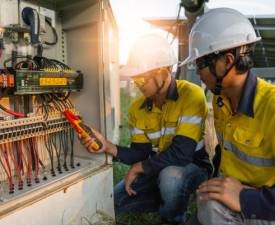Description
Course Name: Diploma in Electrical Safety
Course Id: DES/Q1001.
Education Qualification: 10th Pass.
Course Duration: 370 Hrs.
How You will Get Diploma Certificate:
Step 1- Select your Course for Certification.
Step 2- Click on Enroll Now.
Step 3- Proceed to Enroll Now.
Step 4- Fill Your Billing Details and Proceed to Pay.
Step 5- You Will be Redirected to Payment Gateway, Pay Course and Exam Fee by Following Options.
Card(Debit/Credit), Wallet, Paytm, Net banking, UPI and Google pay.
Step 6- After Payment You will receive Study Material and Online Examination link on your email id.
Step 7- After Completion of Course Study give Online Examination.
Step 8- After Online Examination you will get Diploma Certificate soft copy(Scan Copy) and Hard Copy(Original With Seal and Sign).
Step 9- After Certification you will receive Prospect Job Opportunities as per your Interest Area.
Online Examination Detail:
- Duration- 120 minutes.
- No. of Questions- 60. (Multiple Choice Questions).
- 10 Questions from each module, each carry 10 marks.
- Maximum Marks- 600, Passing Marks- 40%.
- There is no negative marking in this module.
| How Students will be Graded: | ||
| S.No. | Marks | Grade |
| 1 | 91-100 | O (Outstanding) |
| 2 | 81-90 | A (Excellent) |
| 3 | 71-80 | A (Very Good) |
| 4 | 61-70 | B (Good) |
| 5 | 51-60 | C (Average) |
| 6 | 41-50 | P (Pass) |
| 7 | 0-40 | F (Fail) |
Benefits of Certification:
- Government Authorized Assessment Agency Certification.
- Certificate Valid for Lifetime.
- Lifetime Verification of Certificate.
- Free Job Assistance as per your Interest Area.
Syllabus
Diploma in Electrical Safety
COMMUNICATIVE ENGLISH AND COMPUTER FUNDAMENTALS
Building a Simple Worksheet- Entering Text, Entering Values, Entering Dates and Times, Moving Around, Scolding Selecting Ranges, Using Menu, Using Tool Bar, Using Tool Bar, Using Shortcut Menus, Changing Entries, Copying Entries, Moving Entries, Inserting Deleting Cells – Formatting Basics – Changing Character Style, Changing Alignment, Changing Column width, Changing Row Height, Sheet Rename, Conditional Formatting ,Auto Formatting, Working with Multiple Worksheet – copying entries between workbooks, Moving sheets work books, Deleting sheets, Quitting Excel- Opening Existing Workbooks – Simple calculations, doing arithmetic, Totaling Column of values, Naming cells and Ranges.
ACCIDENT PREVENTION AND RISK MANAGEMENT
To provide a general overview of the different means of accident prevention measures used in industry today; to define the hierarchy of risk control. Reactive/Proactive accident prevention Reactive – the traditional management approach – the prevention of repetitions of accidents that have already occurred. Pro-active – the prevention of accidents before they have chance to occur. Eliminate all risks by substituting the dangerous by the less dangerous; Combating risks at source by engineering controls (guards, interlocks etc.) and giving collective protective measures priority; Minimizing risks by the design of suitable systems of work (training, rules, procedures.
SAFETY IN ELECTRICAL SYSTEMS
Common Electrical Hazards, It’s Your Life – Protect it, How Much Electricity is Dangerous, Burn Hazards Associated With Electricity, Definition of “Arc Flash”, Typical Results from an Arc Flash, Approach / Protection Boundaries, How to Determine the Approach Boundaries, Nature of Electrical Accidents, Ways to Protect the Workers, What if we Can’t Deenergize the Equipment, Lockout and Tagout, If You Must Work on Energized Circuits, Who is a Qualified Worker, Personal Protective Equipment, Sealing of Equipment, What is a GFCl, Where are Temporary GFCI’s Required.
FIRE SAFETY AND PREVENTION TECHNIQUES
Fire Prevention, Emergency escape procedures, Equipment operation procedures prior to evacuation, Procedures to account for all employees, Rescue and medical duties for those employees responsible for such duties, Preferred means of reporting emergencies, Employee Training, Fire Protection and Prevention Safe Work Practices, Flammable and Combustible Liquid Storage, Handling Flammable Gases, fire prevention, fire fighting and fire control, characteristics of fire, potential fire hazards, Electric wiring in poor condition, Storage of flammable liquids, fire prevention, fire safety precautions, kitchen fire.
OCCUPATIONAL HEALTH AND SAFETY
Fundamental principles of occupational health and safety, An unacceptable situation, Variations in performance, Countries, Economic sectors, Sizes of enterprise, Groups at particular risk, Major OSH instruments, Key principles in occupational safety and health, National policy on occupational safety and health, National system for occupational safety and health, National programmers for occupational safety and health, Occupational safety and health policy within the enterprise, Management of occupational safety and health, Legislation, enforcement and collective agreements, Occupational health surveillance, Occupational health services.

